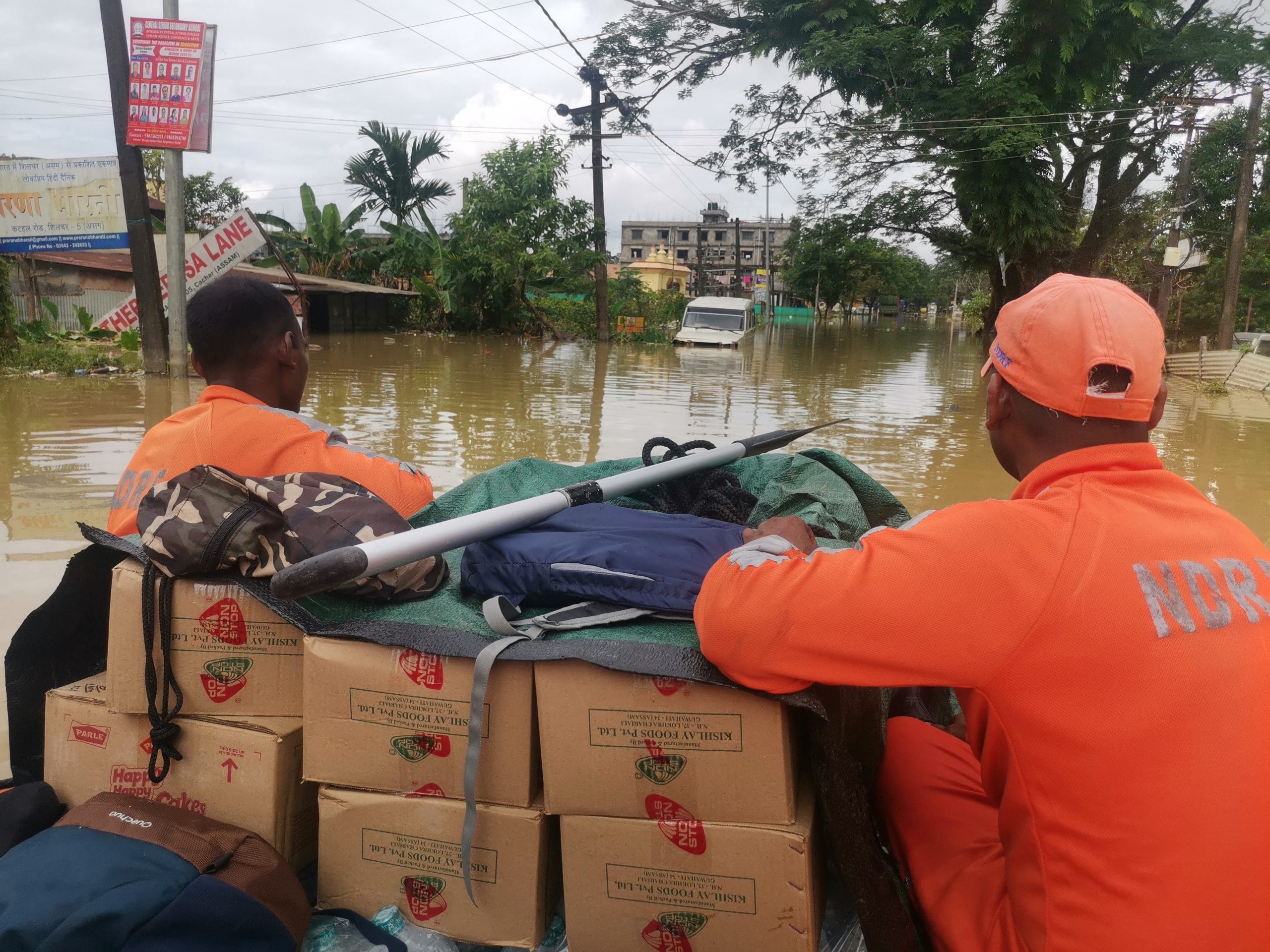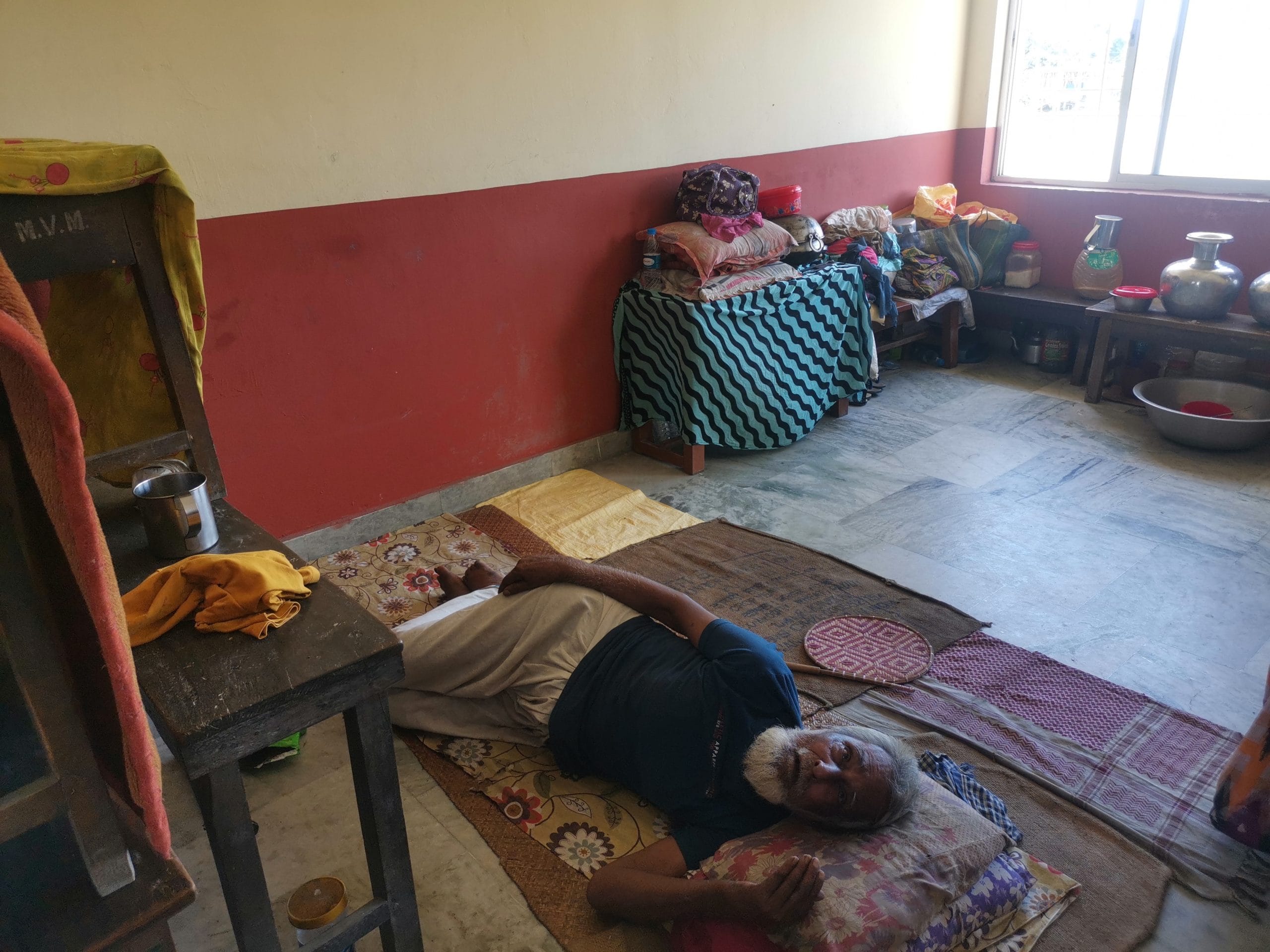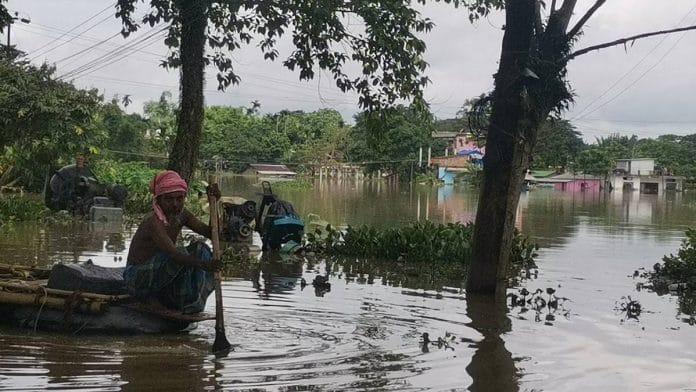Silchar, Cachar: “The waters have only receded by a few centimetres in the last few days,” Zakir Laskar, 27, says from atop a building at the Kathal area in Silchar, in Assam’s Cachar district. Like many others, Laskar and his family were forced to seek refuge in multi-storey buildings after the Barak River breached an embankment Sunday at Bethukandi.
Relief comes Monday evening, as the National Disaster Response Force (NDRF) begins its rounds of relief work in the locality. The men in bright orange load a raft with cartons of water bottles, candles, biscuits, and cakes to hand out to the marooned men, women and children.
“From Monday night, the water entered Kathal Road, we never thought that it would enter our homes. But houses were damaged; I went to an elevated area where my father-in-law lives with my children. But the room was flooded there too. It was a very difficult night,” says Laskar, an auto driver by profession. “We eventually had to come here.”
As many as 2,254 villages and 22 districts have been hit by the flood in Assam. As of Monday, the flood had affected 21.52 lakh people, as well as crops in a 74,655.89-hectare area, according to the Flood Reporting and Information Management System (FRIMS) Assam. With eight more deaths Monday, the toll stood at 134.
While more than 40 per cent of Assam’s land surface is susceptible to flood damage, in Silchar, popularly known as the gateway to the Barak Valley, most of the town is now underwater. There has been disquiet among local residents and those settled outside Silchar over the administration’s handling of the flood situation in the Barak Valley, which encompasses the Karimganj, Hailakandi and Cachar districts.
Out of 1.91 lakh people taking refuge in relief camps across Assam, more than 1 lakh are in Cachar district alone. Similarly, 333 of the total 715 relief and relief distribution camps are operating in Cachar, according to the FRIMS data.
Silchar is the district headquarters of Cachar. Located 326 km away from Guwahati, Silchar town also has strategic importance as the main economic gateway to the neighbouring areas of Manipur and Mizoram.
On Sunday, Assam Chief Minister Himanta Biswa Sarma visited Silchar for the second time in three days to assess the flood condition. He claimed that the flood was “man-made” as he had information that the embankment had been breached by some people.
Also Read: Floods in Assam, need govt’s full attention, Cong asks Shiv Sena MLA Eknath Shinde to leave
No drinking water in areas
Personnel of the 12th Battalion NDRF, who’ve come from Itanagar, pass by the Kathal area on their raft and as they make their way to Singari village in the Ambicapur Gram Panchayat area, a few kilometres away from Kathal.
Houses and trees lie marooned in the floodwater, which is nearly 5 ft deep. Cries for help — mostly for bottles of drinking water — soon reach the NDRF personnel on the raft.
“I am in the Assam Rifles and came home on break to Silchar and got stuck. I have never seen floods like this before. There are three families stuck in this house with us,” says a resident who didn’t wish to be named.

A few residents approach the NDRF raft on makeshift boats they’ve made out of bamboo, thermocol, and tyres to move essential supplies. Within the next three hours, the NDRF personnel have managed to distribute all the water bottles — but it’s not enough to meet the demand.
“We distribute the supplies based on the number of families. We have to tell them to share as much as they can,” an NDRF member tells ThePrint.
“The basic need right now is water, so we’ve been providing them with water, and the minimum that we can carry in our boats. For now, rations are being provided at the relief camps. We are going to distribute that in a day or two,” says Cachar election officer and executive magistrate Navanita Hazarika, who has been overseeing the rescue and relief operations.
Also Read: Monsoon has turned normal, IMD says. But it really hasn’t if you see regional variations
Cramped relief camps

Maharishi Vidya Mandir school, located along Kathal road in the town, is now the temporary refuge of hundreds of families. Each room has been divided into seven to eight areas for one family each.
“I’ve only got vessels and a bed cover here. There’s still shoulder-deep water at home. I used to work as a labourer, but now I have nothing. There’s no work because of the floods now, and I’ve lost everything,” says 54-year-old Tamizuddin Borboiya.
Relief material has been insufficient for the families, he claims. “They dropped food packets earlier, and then sent more supplies with the NDRF, but this isn’t enough. A medical team hasn’t reached us yet either.”
Fish seller Dipu Chandra Das, 35, says that those from the nearby areas had to break the locks to get in. “I had my child on my shoulder and a bag in one hand. We couldn’t carry any of our documents.”
According to district officials, the rescue and relief operations in Cachar district will continue for another few days.
During his visit, the chief minister told the media Sunday that flooding in the town should come down in the next 48 hours if there was no fresh rainfall.
“Many districts of Assam have encountered floods in the past, but nowhere have we had such deployments. Sixty-eight boats are in action; the NDRF, SDRF (State Disaster Response Force), the Army, and the Indian Air Force are working tirelessly to ensure that the relief is reaching the last mile,” Sarma told the media.
(Edited by Tony Rai)
Also Read: ‘Won’t dilute safeguards’, Modi govt defends environment clearance ranking system for states






